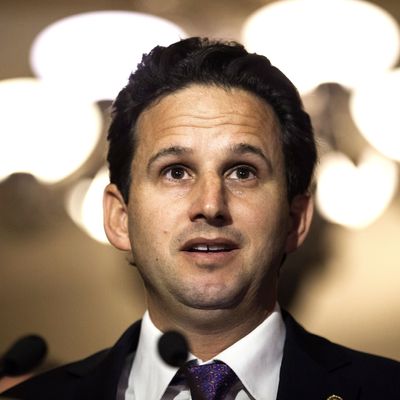
Now that Obamacare has survived its death panel, Democrats are done playing defense on health-care policy. After months of reciting Trumpcare’s many horrors, progressives can finally concentrate on detailing the virtues of their own plans for America’s health-care system. For many, this has meant lobbying congressional Democrats to join Bernie Sanders in backing “Medicare for all.” But Hawaii senator Brian Schatz has been preparing a counter-offer: “Medicaid for all who are into that sort of thing.”
As Vox reports:
Schatz’s bill would give all states the option of opening up their Medicaid programs to uninsured Americans who wish to purchase coverage. It would be similar, functionally, to how states currently have the option under Obamacare to expand their program to all Americans making less than 133 percent of the federal poverty line (about $15,000 for an individual).
It would preserve Medicaid as is for the low-income Americans who already are enrolled on the program. But it would let those who are currently too high-income to qualify pay a premium to join the program. Those who qualify for Affordable Care Act tax credits would be able to use the subsidies to buy into the Medicaid program, just as they do right now to buy private coverage on the marketplace. That would make Medicaid into the Affordable Care Act’s public option, creating another insurance plan in markets with few or no private plans and putting private payers in competition with the much cheaper Medicaid system.
Schatz’s plan has many virtues. Allowing states to offer Medicaid as a public option would (almost certainly) make health care more affordable for those buying insurance on the individual market, including middle-income families who are currently stuck with private plans they can’t afford to use. It would also help control health-care costs, since the program’s reimbursement rates would be lower than those of a typical insurance provider. What’s more, Medicaid buy-in could lay the groundwork for straight-up socialized health insurance, as private insurers would struggle to compete against a much cheaper government-run program — a possibility that Schatz alluded to in an interview with Vox.
“I’m agnostic what [my bill] may do to the private insurance market,” the senator said. “I don’t have a strong ideological bent there. If the private insurance market can survive, in a context of a public option, good for them. But if they can’t, then that will tell you something about the nature of the market.”
Critically, Medicaid buy-in would achieve all this without requiring large tax increases; throwing anyone off their employer-provided plans; or, even, altering the health-care systems of uninterested red states in any way.
The proposal would probably attract the ire of the health-care industry. But that lobby would be lonely in its opposition — or, at least, lonelier than it would be in a fight over single payer. Against the enemy of single payer, the health-care industry would be able to make alliances with Americans who like their employer-provided insurance, Medicare recipients who don’t want to share their socialized medicine, and upper-middle-class voters who bristle at the mention of tax increases.
Medicaid buy-in, by contrast, has few natural enemies. In fact, the policy might even draw strength from one of the forces that fueled the backlash to Obamacare: middle-class resentment of free stuff for the poor.
Last December, Vox’s Sarah Kliff interviewed pro-Trump Obamacare enrollees in Kentucky. She found that one of this population’s biggest complaints with the Affordable Care Act was that it had given people who “don’t want to work” access to cheaper, more affordable care than the lower middle-class enjoyed. Conservatives are the typical beneficiaries of this sort of classist (and often racist) spite.
But in pushing the idea that low-income people shouldn’t be the only ones with access to Medicaid, Democrats could actually make this resentment work in their favor.
One knock on Medicaid, traditionally, has been its relatively small provider network. But Schatz’s bill preempts this complaint:
The Schatz bill would also raise Medicaid’s payment rates to doctors and hospitals to match those of the Medicare program. Currently, the Medicaid prices are 72 percent of those that Medicare pays — which in turn pays less than private insurers. Raising Medicaid prices to be equal would likely lure more doctors to participate in the program — but also make Medicaid (and the premiums to buy into Medicaid) significantly more expensive.
From a progressive perspective, the defects of Medicaid buy-in — when compared with single payer — are considerable. It would do far less to thin the ranks of the uninsured and establish basic health care as a fundamental right in the United States. And the federal nature of Schatz’s proposal means that it could end up doing nothing for the residents of deep red states, many of which still haven’t capitalized on Obamacare’s Medicaid expansion. The stakes of these shortcomings aren’t merely abstract or ideological: Tens of thousands of Americans die for want of health insurance every year.
Nonetheless, Schatz insists that he supports single payer, and would vote for it if ever came to a vote. He just doesn’t believe that progressives can afford to make “single payer or bust” their only offer on health care. And he’s probably right.
Given the political obstacles to the abrupt abolition of private insurance, it’s likely that the next step toward universal health care in the United States will be some kind of public option. Medicaid buy-in is weaker than some of the public options currently being debated in progressive circles. One would hope that a unified, Democratic government could do better. But Schatz’s proposal may be the most politically painless means of expanding access to government-provided insurance.






























